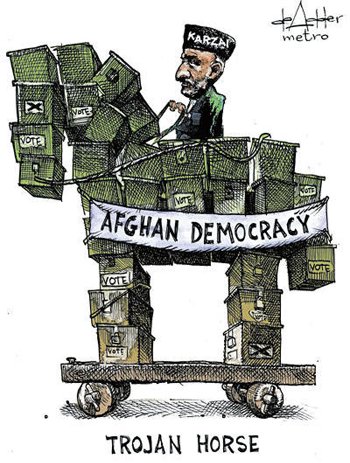The Killid Group, January 18, 2014
The 2009 shadow on 2014 election
“In elections in 2009 I was threatened by US officials particularly Galbraith who called me on the phone and told me that if I announce the first round of elections ‘you dig a grave for yourself’”
By Mohammad Reza Gulkohi
The rift between Kabul and Washington has again widened with statements by Minister of Transport and Civil Aviation Daoud Ali Najafi and a former US defence secretary Robert Gates. US claims of impartiality in Afghan polls are at stake.
Gates has said in a memoir that is hitting the stands that top US diplomats tried to manipulate the outcome of the 2009 presidential election, and stop President Hamid Karzai from winning a second term.
Reacting to the disclosure, the then head of the Independent Election Commission (IEC), Najafi, said he was threatened by US officials, particularly Peter W. Galbraith, a former US diplomat who served as the second-highest-ranking UN official in Afghanistan, and was fired in October 2009 after clashing with his boss – UN special representative in Afghanistan Kai Eide – over how to contend with allegations of fraud in the country’s presidential elections.
“In elections in 2009 I was threatened by US officials particularly Galbraith who called me on the phone and told me that if I announce the first round of elections ‘you dig a grave for yourself’,” Najafi said. He added the elections went into a second round due to pressure from the US.
The revelations have cast a shadow on US impartiality in the coming presidential elections. Political watchers are thinking Karzai may be justified in demanding transparency in the election as a condition for signing the Bilateral Security Agreement (BSA) with the US.

Abdul Hamid, a resident of Ghazni, voiced aloud his fear that his vote will count for little in the April election if it is the US that decides the winner.
Some Members of Parliament (MPs) have accused Washington of trying to influence the vote by backing a “favoured candidate”. No one has been identified by name.
Abdul Jabar Shulgari, former MP from Ghazni, observed the publication of Gates’ memoir “could have negative effects” on the electoral process. Gates, who was appointed by George W. Bush, was retained as defence secretary by his successor President Barack Obama. Shulgari, picking on Gates’ comment that Obama “can’t stand” Karzai, claimed the US will “follow its goal in Afghanistan and try to keep its interests intact after elections on April 5”.
Observers think pressure on the IEC to ensure the election process is fair has increased with Gates’ disclosures. But IEC officials are confident. Najafi stiffly resisted the meddling by outsiders in 2009, they point out.
Buying support
Meanwhile, there are new fears that the US may try to persuade candidates to step down in favour of someone who favours them for money considerations.
Political analyst Masim Ghaznawi believes this may be a possibility in a situation where the candidate is from a political party that is dependent on outside support. “That would make them susceptible to interference from other countries,” he feels.
Under Article 35 of the Constitution a political party has to be open about its financial sources. But this is not enforced.
There are allegations that some candidates are seeking alliances with foreign governments particularly the US.
The government has repeatedly sought to counter fears of outside interference in the polls. In October, after the names of the presidential candidates were announced, Karzai made a fervent appeal to government officials to ensure fair and free elections.
The National Security Council (NSC) announced no country would be allowed to interfere with the process.
Gates’ revelations are a warning to the IEC, observes Hamid Sayee, writer and journalist. Says Kalsoom Satarzai, the head of Afghanistan Civil Society Network, the government and UN should also remain impartial.
Characters Count: 4559
